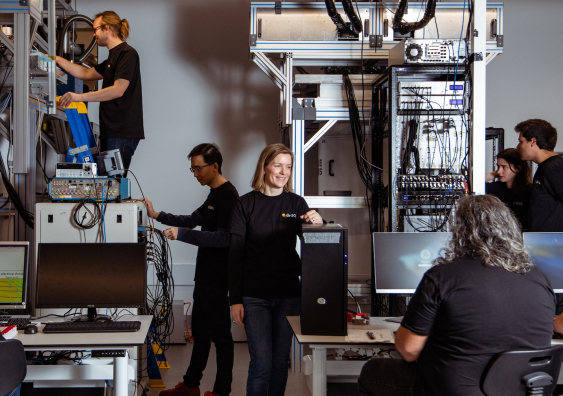UNSW engineers get quantum computing processors working at 20X warmer temperatures
2024-03-28T09:00:00+11:00

Scientia Professor Andrew Dzurak, Dr Henry Yang and Jonathan Huang.
Photo: Anna Kucera
Advanced quantum computer cooling techniques could lead to more powerful, cost-effective and energy-efficient systems sooner.
Quantum computing engineers from UNSW Sydney, working for UNSW spin-out , have reached a key milestone by unlocking the potential of quantum computers to operate at warmer temperatures.
The achievement demonstrates that ‘hot qubits’ are now a reality after the same engineers showed in an innovative paper in 2020 that they were theoretically possible. Since then, fidelities exceeding 99% for both readout and initialisation have been demonstrated.
In a study published in today, the UNSW engineers demonstrated the capability of their spin-based quantum processors to operate at temperatures 20 times warmer than previously demonstrated, while maintaining stability and high accuracy.
Traditional silicon chips generate heat, a familiar issue when using electronic devices. Several leading quantum computing systems in the current landscape require cooling to extremely low temperatures, very close to absolute zero (-273.15 °C). At higher temperatures, the qubits falter, rendering the technology impractical.
This new research demonstrates high-accuracy spin-based quantum computation at temperatures above one Kelvin – or -272° C – a temperature compatible with the ability of conventional electronics to operate. This makes it possible to run complex error correction routines required for fault-tolerant quantum computing, setting a path to realistic and useful quantum computers, according to Jonathan Huang, lead author and PhD student at UNSW and Research Associate at Diraq, the spin-out company partly funded by UNSW.
“This temperature increase, although difficult to grasp when compared to conventional temperature concepts, is actually groundbreaking in the realm of quantum computing,” said Mr Huang. “Our advanced engineering achievement involved a deep understanding of physics as well as the experimental curiosity to push the boundaries of engineering design.”
Built to scale
Addressing the scale-up challenge in quantum computing to reach millions of qubits, Diraq’s innovative hardware – which is constructed using a novel technology known as spins in silicon – sets the company apart from more established competitors, says UNSW Scientia Professor Andrew Dzurak, CEO and Founder of .
“While our quantum processors still require refrigeration, the costs and complexity of the overall system are dramatically reduced at these elevated temperatures,” said Dzurak.
“Harnessing the power of ‘hot qubits,’ these quantum computers will enable calculations far beyond the reach of supercomputers that exist today, enabling faster and more accurate predictions and analysis. This will also save costs and energy when running calculations to solve problems of global significance, generating significant economic outcomes.”
UNSW quantum computing engineer and Head of Quantum Control at Diraq, Dr Henry Yang was lead author of the team’s published in Nature in 2020 that created awareness of the challenges and opportunities of operating ‘hot qubits’.
“We were motivated by the challenge to achieve high accuracy qubit control, initialization and readout at elevated temperatures,” Dr Yang said. “That’s why we undertook such a meticulous exploration of physical parameters to reach our goal.”
Unlocking full potential
With a strategic vision to be an end-to-end quantum computing provider, the Diraq team based at UNSW aims to combine the value propositions of today’s chip manufacturers, cloud computing companies, and software algorithm providers to unlock the full potential of quantum computing – an industry projected to generate $450 to $850 billion in value creation by 2040.
Quantum computing operates on principles distinct from classical computing, harnessing the power of minute quantum interactions to tackle large, complex problems. This intricate approach necessitates tailored algorithms, hardware and software specifically designed for quantum systems.
By leveraging modified transistors, the same fundamental components powering the digital devices integral to our daily lives, the engineers can use existing silicon chip ‘foundries’ for manufacture, tapping into decades of knowledge and trillions of dollars of investment that underpins today’s semiconductor industry.
The encoding of qubits in semiconductor spin carriers has been recognised as a promising approach to a commercial quantum computer that can be lithographically produced and integrated at scale.
The transformative applications of quantum computing are expected to impact pharmaceuticals, materials science, finance, logistics, weather forecasting, and efficient management of energy storage and distribution.






